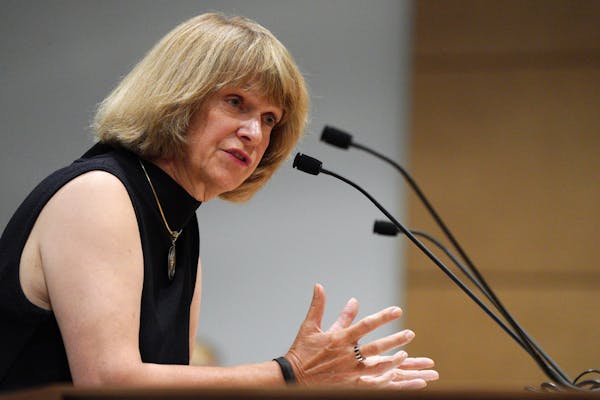Minnesota Department of Human Services Commissioner Jodi Harpstead will be leaving the massive agency after more than five years in the job.
Her departure, which Gov. Tim Walz announced Monday, comes as the department has once again come under scrutiny for fraud in programs it oversees and as DHS is being split into three entities — a historic shake-up to the state's largest agency.
"I am proud of her work running the most complex and wide-ranging agency in state government," Walz said in a statement. "I am especially proud of how Commissioner Harpstead supported the enterprise-wide work to separate DHS into three separate agencies, which will make each of them more effective, more accountable, and easier to manage."
The department, which serves some of Minnesota's most vulnerable populations, has long been dogged by financial abuse of its programs. It most recently came in for criticism as the FBI raided two autism centers that each received millions in Medicaid reimbursements through the state's early autism intervention program.
Lawmakers and Walz have been proposing changes to rein in fraud across state programs. Walz recently pointed to state agencies' lack of skepticism in administering public money, saying there is a "culture of being a little too trusting."
A DHS spokeswoman said it was Harpstead's decision to leave and she is doing so voluntarily. Her last day will be Feb. 3.
"I have been so proud to be the Commissioner of the caring, competent, and high-capacity Department of Human Services," Harpstead said in a statement announcing her departure. "I'm pleased that we were able to balance new, stronger process controls with greater responsiveness to community partners, worked with the DHS grants and contracts team to imagine a re-design of the agency's thousands of grants, and built an unparalleled team of strong senior leaders."
She took over DHS less than a year before the pandemic hit, stepping into the job at another chaotic moment for the agency. Former DHS Commissioner Tony Lourey abruptly quit six months into the role, and two of his deputies had also resigned. She took over an agency still reeling from the leadership changes, which was also trying to address fraud in its Child Care Assistance Program and Medicaid overpayments to two tribes.
While navigating the COVID-19 crisis, she took steps to bolster the agency's accountability and internal controls in a project she called "Operation Swiss Watch." However, the agency continued to struggle with financial oversight.
A number of audits from the Office of the Legislative Auditor in recent years have highlighted issues, including deficiencies in DHS' management of grants for housing and behavioral health, and its lax collection of tens of millions owed by medical providers and long-term-care facilities.
Harpstead also aimed to hire a diverse staff for key leadership decisions, but grappled with concerns from DHS employees who said the agency was a toxic environment for people of color.
Her tenure saw one of the most significant changes in DHS: The decision to split the agency into three entities.
Some state leaders are concerned the department, which employs more than 7,400 workers and spends close to $30 billion each year, has gotten unwieldy. They chose in 2023 to start the process of creating a Direct Care and Treatment agency, which would run facilities including psychiatric hospitals, substance abuse treatment centers and the sex offender treatment program, as well as a Department of Children, Youth and Families.
The transition to three departments is still underway. DHS' eventual role will be more narrowly focused on managing Medical Assistance, the state's Medicaid program, as well as some other programs.
Before joining state government, Harpstead was president and CEO of Lutheran Social Service of Minnesota. She previously spent more than two decades at Medtronic.
Republican legislators called for stronger fraud prevention following Walz's announcement Monday.
"A new commissioner must create a culture of accountability, support investigatory activity, and make proper use of taxpayer dollars," GOP Senate Leader Mark Johnson, R-East Grand Forks, said in a statement. "They must hold grant recipients, state employees, and themselves to the highest standards of transparency and accountability."
Harpstead's departure is not the only significant staffing change at the department. Last week, Harpstead announced DHS' Inspector General Kulani Moti was switching roles. Moti has been the inspector general for five years, and was the office's general counsel before that.
The DHS Office of Inspector General oversees licensing and background studies of providers and is supposed to ensure taxpayer dollars are spent efficiently by investigating and preventing fraud, waste and abuse.
Moti accepted a new position as senior counsel in DHS' general counsel's office and will be leading a couple of key projects in that role, Harpstead said in an email announcement to staff.
"I am grateful to Kulani for her time in our Office of the Inspector General where she has led efforts to modernize our child care licensing process, support providers through the COVID pandemic, and to transition a major residential organization to new ownership with no loss of services, among other things," Harpstead wrote.
Ryan Faircloth of the Minnesota Star Tribune contributed to this story.

Minneapolis City Council lowers street food cart license fee, hoping fruit sellers will hawk legally

How the federal raid unified the fractious Minneapolis City Council against Trump, sort of
Trump travel ban 'cruel,' Minnesota advocacy group says

No verdict after first day of jury deliberation in Derrick Thompson murder trial for crash that killed 5

